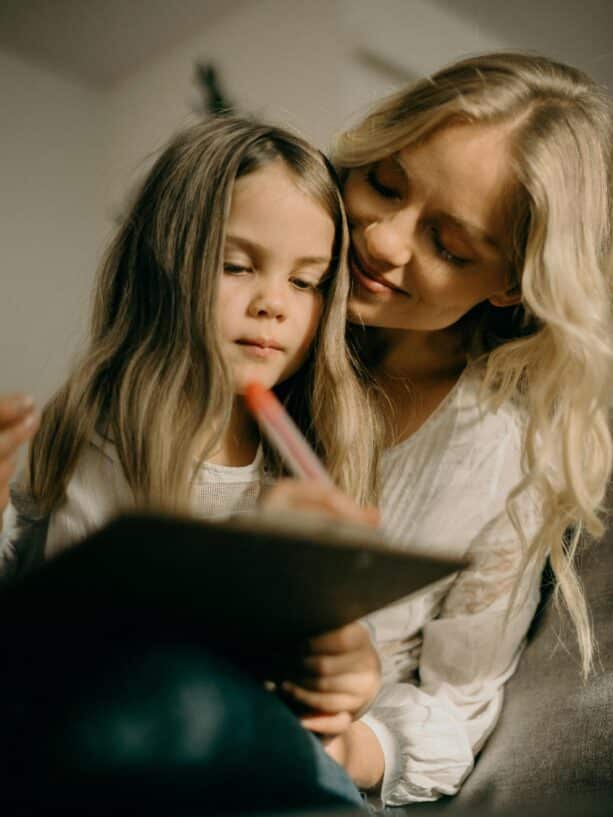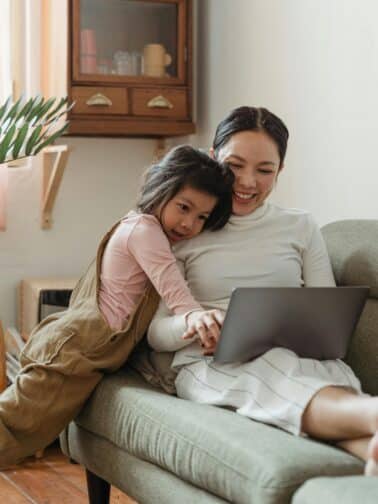“It’s not all your parents’ fault.”
In the words of the inimitable Chandler Bing, could there BE a more provocative phrase to say to someone in therapy?
All joking aside (but really, I do love Friends), this is not exactly what I would ever say to a therapy client.
When and if the time comes to talk about why and how parents were the way they were, we have a more nuanced, less provocative expressed conversation about what may have led to parents behaving the way they did in the early childhood years.
We invite a wider lens into our conversations about the pain and suffering endured, and we begin to talk about how the abusive major forces of the world may have shaped their own individual parents’ behavior.
We have a conversation about social justice.
It’s Not All Your Parents’ Fault; Early Childhood Abuse Is A Social Justice Issue.
Before having my daughter, I could only intellectually guess at what I now know in my bones: having a child can be, at times, unrelenting, exhausting, and trying.
And then, having a highly spirited young child in a global pandemic with no community or parental support in any way shape, or form for nearly 1.5 years is next level hard.
And we are privileged.
We are incredibly privileged to be able-bodied, employed, and economically secure. To be White and not the target of racial aggression. To have done lots of personal growth work prior to becoming parents. And to have had reproductive rights and freedom to delay having a child until our mid-thirties.
We are privileged, too, that we are a couple. And that the whole burden is not falling on one of us.
Still, it has been an unbelievable hard stretch of time. It has tested our emotional regulation capacities regularly and sometimes brutally.
And that’s with all of our privileges.
Being a parent to a child in early childhood without those kinds of privileges? That’s a kind of hard I can only imagine at this point.
So why am I sharing this?
I’m sharing this because I now know – through lived experiences – that being a parent and attempting to do it well is, by far, the hardest job on the planet.
It’s why I personally consider those doing their very best, day in and day out. To give their children childhoods that they won’t need to recover from, as goddamn heroes.
I’m sharing this, too, because parenting without privilege and being at the mercy of abusive social and systemic forces is harder still by leaps and bounds.
I’m sharing this because I know that the reason I am able to show up and be a good mother most of the time (not always, though – I’m no saint) is because I was born when and where I was in time, able to take advantage of birth control, education access, financial freedoms, and political freedoms not afforded to the generations of women who came before me.
And, we have to name it: I was also born white, able-bodied, and neurotypical. And thus able to move through the American education system. (still only largely designed for someone with my neurotypical brain structure) Easily.
My privileges have made me a (mostly) good mother.
Despite the fact that I come from a background of early childhood abuse from parents and, at times, poverty.
Do You Feel Shakier Inside Than Your Life Looks on the Outside?
A quiz to help you understand why you might feel less stable beneath the surface despite working so hard to build a good life.
START THE QUIZ
If I didn’t have these privileges (and if I hadn’t taken advantage of them) and if I came from a background of early childhood abuse? I think it would be a far different story.
My ability to (mostly) emotionally regulate myself and to manage my autonomic nervous system, to provide stable housing and consistent food for my child, to exist in a solid, good partnership, my ability to pay for my own private pay therapy so I don’t have to disappear into alcohol or other addictive behaviors to cope with the stress… these are all choices and impacts resulting from my privilege. Not luck. Privilege.
Parenting my daughter with mindfulness about my inherent privileges has given me a wider lens on “parental fault” and helped me understand how so many of the painful, abusive moments that my clients may have experienced were shaped by not just their parents’ stand-alone behaviors, but that those egregious behaviors were often the attendant impacts of abusive systems and forces that the parents themselves endured.
What do I mean by this?
I’m a Feminist therapist and I strongly believe that we live in a world shaped by the forces of Patriarchy, Colonialism, Misogyny, and Capitalism.
Those forces have shaped our systems and structures since time immemorial (I often in my essays say “since the dawn of Judeo-Christianity” but Kara Cooney, PhD, a brilliant Egyptologist based at UCLA is shining a light at how ancient cultures were also Patriarchal as well despite some females achieving “power.”).
These forces have subjugated women, people of color, the differently-abled, the neurodiverse, and anyone who is considered “other” (other being in reference to cis, hetero, neurotypical, White men) and have led to some (a very small slice of the planet) receiving more while others (the vast majority of the planet) receive less.
Concretely what this means is that most of our parents, grandparents, and ancestors have been at the mercy of these abusive forces.
And therefore their own actions with their children were reflections of the forces they had to endure (think slavery, racism, poverty, invasion, war, displacement, food deserts, internment, denial of reproductive rights, denial of education access, inability to steward their finances, lack of social safety nets, abysmal parental leave policies, broken healthcare systems, and so much more).
With such abusive forces at play in their own lives (not to mention the lives of their parents who came before then), their ability to be regulated, empathetic, loving, and logistically and emotionally present parents would have been greatly hindered (if not impossible).
For examples of this, I think about Kate Winslet’s character in Revolutionary Road. How stuck she felt and how she suffered because of what society dictated she could and could not do at the time and what was expected of her as a woman. I think about how her children may have witnessed this suffering, this anguish in their mother’s soul, and how it would have impacted them. I wonder if she dies at the end of the film after attempting a home abortion to, in a way, try to save her life… And I think about the tens of millions of housewives in the 1950s who were not fictional and who may have actually lived like this.
I think of the 20th century Irish Catholic mother in small-town America.
Who didn’t, in her heart of hearts, really want to be a mother but who was “mandated” by her faith that she abstain from birth control and have as many children as her God willed. I think of how she may have coped with her postpartum depression and general suffering by drinking. How this may have impaired her behavior regulation. And then how her many children would have witnessed her alcoholism. If not been at the physical abuse receiving end of her existential rage and what impact that would have had on them.
I think of the cis, White, hetero young boy raised in the 50s and 60s in a culture that told him amalgams of messaging such as “you’re the best and others are not and you can own your wife’s body” and how these messages would have shaped him into perpetuating abusive dynamics with his wife, absolving him of personal responsibility for his actions in his business dealings, and how living with a misogynistic, abusive father would have impacted the well-being of his young daughters.
I think of a toddler, torn from her mother’s arms at the Texas border.
And the severe attachment wounding she will endure as she grows into adulthood and how this might play out with her own children because of the criminal way the US government treated asylum seekers.
And jumping forward in time to today, I think of a young 15-year old girl.
Now living in Texas, sexually assaulted and raped by her date and not able to now legally obtain an abortion to cope with her trauma and prevent herself from an unwanted teen pregnancy. I think of the limited and limiting choices and herculean pressures she will now have been forced into (through no fault of her own!) and what the physiological and psychological trauma impacts on her and her child will be because of the dominant political forces that waged an unjust war on her woman’s body.
In each of these cases, I think about how the context of the lives we live shapes who and how we are with our children.
I think about how the need for relational trauma recovery doesn’t happen in a vacuum.
People from healthy, functional, relationally responsible, and socially supported backgrounds don’t wake up one morning and spontaneously, willfully, and consciously decide to erode the safety, well-being, and dignity of their children.
Psychologically whole and healthy people do not do this.
But hurting people hurt other people.
And many people are hurting because of the abusive, dominant forces that have shaped our world since time immemorial.
Now please, hear me out: this essay is not about absolving parents of their responsibility and culpability in perpetuating abuse with their children.
I would never, ever suggest that someone’s feelings and experiences are invalid or that you should “forgive” your abuser because their abusive behavior was shaped by the context of their lives (quite the opposite, in fact).
I truly believe you can have understanding and compassion for someone and their own experience, and still not have a relationship with them or not ever forgive them.
So this essay is not about permissing bad behavior, victim-blaming, or gaslighting anyone into premature forgiveness or single-note compassion.
That is not what I stand for.
Instead, what I stand for is helping each and every person who comes from a relational trauma background to do whatever personal work they need to do in order to live a beautiful adulthood despite their adverse early beginnings.
AND, I also believe that doing our own personal work to become psychologically and physiologically whole and healthy people IS – full stop – an act of social justice.
I believe this because the more people who can see individual abusive behaviors and collective abusive systems more clearly will, in turn, stop perpetuating this abuse on their own children (or anyone else in their lives) and also be more equipped to call out and challenge the abusive forces that they see in the world.
So again, this essay is not about forcing forgiveness with your parents’ or dismissing or diminishing your lived experience; rather, the point is to invite a conversation and hold a wider lens about how and why your own personal story happened and how it might be inextricably linked to the global historical context.
Wrapping up.
Now, I would love to hear from you in the comments below:
What came up for you when you read this essay? Do you believe that childhood abuse is a social justice issue? How do you personally hold a wider lens about why and how your parents acted as they did alongside the potentially painful feelings you have about what they did?
If you feel so inclined, please leave a message in the comments below so our monthly blog readership of 20,000+ people can benefit from your wisdom and your participation in this conversation.
Here’s to healing relational trauma and creating thriving lives on solid foundations.
Warmly,
Annie





